ON. Rimsky-Korsakov opera "Pskovytyanka"
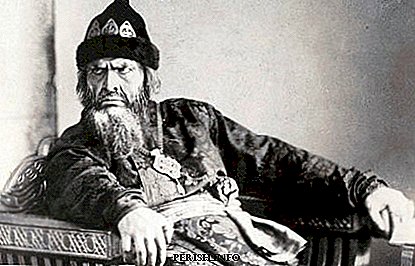
Debut opera ON. Rimsky-Korsakov he didn’t let him go all his life - for almost 30 years he repeatedly processed “The Woman of Pskov”, wrote to her a separate opera-prologue “Noblewoman Vera Sheloga”. And, despite the fact that the success of the first production during the life of the author was never surpassed, the magnificent part of Ivan the Terrible provided an opportunity for creative disclosure for the great Russian basses, among them F.I. Shalyapin.
Summary of the opera Rimsky-Korsakov "Pskovyanka"and many interesting facts about this work read on our page.
Characters | Vote | Description |
Ivan the Terrible | bass | Russian king |
Prince Yuri Tokmakov | bass | royal protege in Pskov |
Michael Tucha | tenor | son of mayor |
Princess Olga | soprano | his beloved daughter of Prince Yuri |
Boyar Matuta | tenor | Olga's rich and noble bridegroom |
Summary of "Pskovityanki"
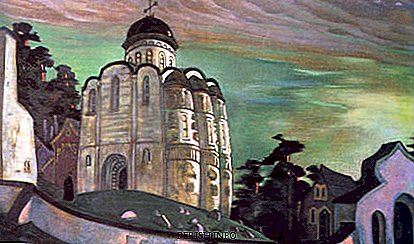
Pskov, 1570
Princess Olga in her garden spends time with her friends, but she is not occupied by girlish entertainment - she is waiting for news from her beloved. One of the girls, seizing the moment, reports that Mikhail will come to her for a date.
The evening meeting of lovers is clouded by thoughts about the future - Olga is married to her father for the wealthy boyar Matutu. Mikhail is making plans for making money in the Siberian lands, which will give him the opportunity to fight for Olga's hand, but the girl pleads with him not to embark on a dangerous path, she intends to dissuade her father from the plans for her marriage.
Tokmakov and Matuta, who went into the garden, interrupt their meeting, and Olga unwittingly becomes a witness to a frank conversation: Yuri Ivanovich admits that the girl is not his daughter. Her mother is Vera Sheloga, his late wife's sister, and her father is completely unknown. Bell ringing calls for men in the veche. Olga, stunned by such news, seems to be mourning for her.
On the main square of Pskov it is crowded: people gathered at the call of the bell - the messenger from Novgorod brought terrible news: Ivan the Terrible with the guardsmen had inflicted cruel reprisals on the citizens and was sent to Pskov. Prince Yuri appeals to humility: it is necessary to meet the king warmly and cordially. But Mikhail Tucha is ready to protect the city from desecration, and together with like-minded people he hides himself more often in order to come to the aid of Pskov, if the royal army begins to fool around here.
There are tables on the square, all waiting for the king to come. For unclear reasons, Olga is the most excited - she has a passionate desire to see the Terrible. He appears, the people welcome him.
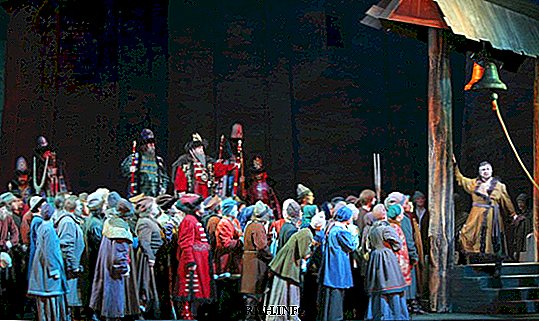
In the house of Tokmakov, the Terrible meets with Pskov nobles. Despite the warm welcome, treason seems to be king. He demands that the prince be the first to taste from his cup. When Olga brings a drink, he draws attention to her resemblance to the random lover of her youth. When Grozny is left alone with Prince Yuri, he tells the story of the appearance of a girl in his house. The king realizes that he has just learned his own daughter and changes his wrath for mercy.
In the Pskov forest - the royal hunt, here Olga goes to the monastery for prayer. She deliberately loses the trail of companions - waiting for her cloud. Matuta interrupts the tender scene - he imperceptibly followed Olga. Ranying Cloud, he takes the girl with him and goes to the royal hunting stakes to inform the traitor and rival.
Tsar Ivan does not want to hear slander against the townsman’s son from the man who designed the abduction of Olga. He inquires from her about her past life, about her childhood. Sudden noise attracts attention - this is Mikhailo, despite the wound, came with a weapon to release his beloved from bondage. There is no limit to the wrath of Grozny, he orders all to be destroyed, and the cloud to be delivered alive. Mikhailo manages to escape, Olga rushes after him. The arrows aim at the fugitive, but they hit the girl. The unfortunate king mourns over his daughter's body.
| Duration of performance | ||
| Iact | Act II | Act III |
| 60 min | 40 min | 45 min. |
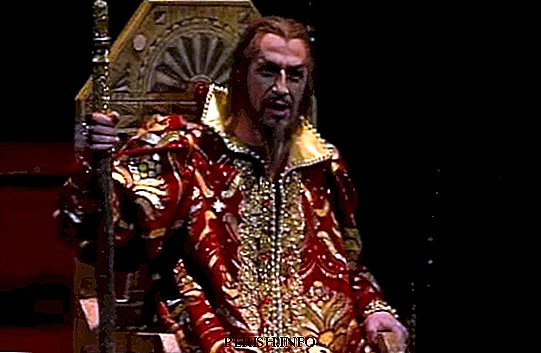
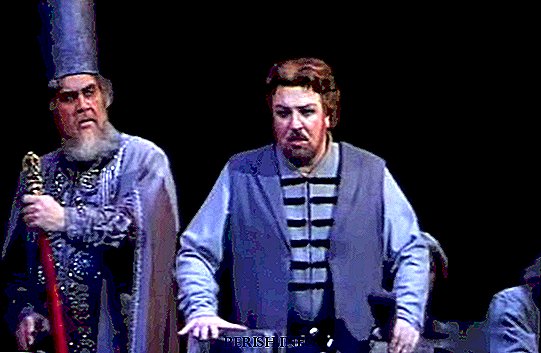
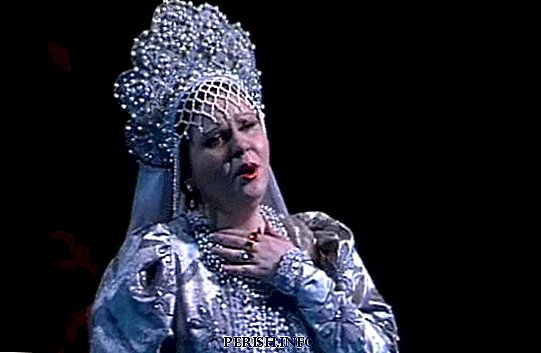
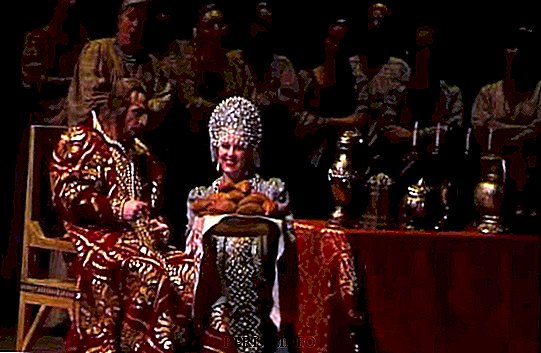
Interesting Facts
- M. Balakirev I thought that Rimsky-Korsakov will not write an opera better than "The Maid of Pskov".
- You can get acquainted with Pskovytankoy by looking at the recording of the 1999 Bolshoi Theater production directed by E. Svetlanov. The main parties are V. Pochapsky (Grozny), M. Gavrilova (Olga), L. Zimnenko (Tokmakov), P. Kudryavchenko (Cloud).
- The composer dedicated his first opera to like-minded people from "Mighty handful"(" dear mug ").
- The Pskovytinki has a lot of intersections withBoris Godunov" M.P. Mussorgsky. This can be explained by the fact that during the period of intensive work on both operas, composers not only closely communicated, but also lived together.
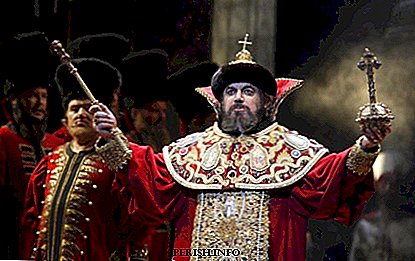
- It was not only the creation and processing of opera music that took several decades - the libretto of “The Woman of Pskov” was also written by L. Mei for 9 years. The plot of the opera is fictional, but it is based on a historical event - the arrival of Ivan the Terrible in Pskov in 1570 after the Novgorod pogrom, during which up to a third of the Novgorod population was killed. In Pskov, the tsarist repressions did not have such a massive character, in part, because of the local holy fool, who predicted many evils if Grozny would encroach on the lives of the Pskovs.
- The only domestic film in which F. Shalyapin starred was the silent picture of 1915, Tsar Ivan Vasilyevich the Terrible, based on the opera Pskovytanka. The singer was also the co-founder of the Fellowship of Sharez, who shot the film. Chaliapin was dissatisfied with his first shooting experience, as the team "Motor!" often did not coincide with his acting mood. However, the picture remained forever in the history of cinema also because its first role was played by M.I. Zharov.
The best numbers from the opera "Pskovityanka"
"Alone in the forest ..." - Olga's arioso
"You jump, cuckoo" - the song of the Clouds
The history of the creation and productions of "Pskovytyanka"
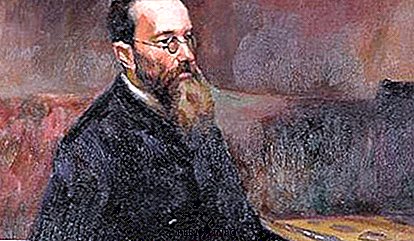
What story can dream of a young 24-year-old composer? Undoubtedly, about big, serious and solid, full of truth and scope. These criteria were met by the historical drama L. Mey's "The Pskovite Woman", where one of the central characters was Tsar Ivan the Terrible. However, it was not a political, but a human story.
The melodies of the opera to the composer’s creative imagination were inspired by the Russian spaces and impressions of the trip to the Tver province - several scenes were written in anticipation of the journey and after it. But then the work moved slowly - the Stone Guest guest needed to be orchestrated. Dargomyzhsky, there has been an interesting essay "Mlada", which was attended by several members "Mighty handful", including Rimsky-Korsakov.
In 1871, the composition of the opera moved to the active stage. The last point in the score was set in early 1872. Immediately, the author sent his brainchild to agree with the censor and was initially refused. There were two reasons - the image of Pskov as a city with a developed local government, practically an alternative to royal power, and the presence on the stage of the monarch as a character of the opera. Rimsky-Korsakov received approval for staging only through the patronage of Grand Duke Constantine.
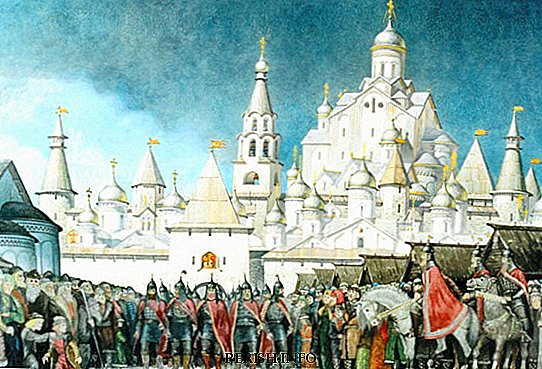
Opera frankly did not like E.F. Napravnik, the chief conductor of the Mariinsky Theater, perhaps, sincerely, and possibly because of the article that Rimsky-Korsakov published a few years earlier. In it, he youthfully thoughtlessly criticized the debut opera of Nizhniy Novgorod. But, since permission for the production was given "from above", the troupe and orchestra began rehearsals.
January 1, 1873 "Pskovytyanka" was performed on the imperial stage. Tsar Ivan sang O. Petrov, Olga - Yu. Platonov, Tokmakova - I. Melnikov. In the first season, the opera went 10 times with sold out. However, the press did not praise her. The author himself noticed the musical flaws resulting from the lack of skill.
Three years later, the composer began to rework the opera. By 1878, new episodes were written: the prologue, the scene at the Pechersky Monastery; rewritten many duets and arias. Nikolai Andreevich and his entourage recognized that the music had become more professional, but the opera itself was heavy and dry. This edition was not staged at the Mariinsky Theater. The composer especially did not insist on the stage version, being aware of all the shortcomings, sending a request only once to the directorate and without doing anything else. In 1891, having already much more experience behind him, Rimsky-Korsakov again takes up his first opera. In 1895, the third edition saw the light in the amateur Panaevsky Theater, where four performances took place. A year later, in the game of Tsar Ivan, F. Shalyapin spoke.
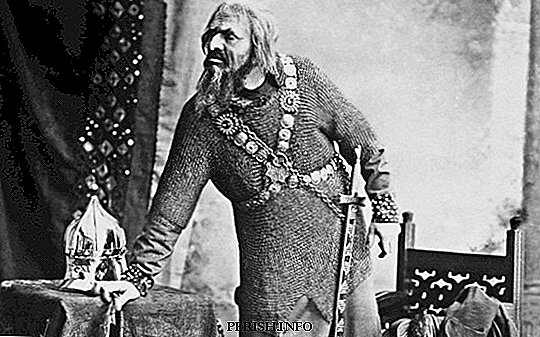
In 1898, the composer wrote a prologue to the events of "The Pskovytyanki" - "The Boyfriend Vera Sheloga"; two operas were presented on one imperial stage in one evening - in the Bolshoi Theater (1901) and in the Mariinsky (1903). In these performances in the party of Ivan the Terrible Chaliapin came out. The singer won the great love of the public, but the success of the opera as a whole was incomparable with the one she received at the premiere.
In the 20th century, the "Pskovytanka" stepped over the Russian border and sounded in Italy, Great Britain, Belgium, and Spain. One of the first foreign performances was the Parisian, 1909, as part of "Russian seasons" Dyagilev. The posters were showing the name "Ivan the Terrible" - more cash and understandable to a foreign audience, the most popular Shalyapin appeared in the title party. On the Soviet stage, the opera was in the leading theaters of the country. Since 2008, The Pskovityanka has always been present on the playbill of the Mariinsky Theater; this production has become a major renewal of the 1952 performance. In 2010, the opera was performed in historical scenery - under the walls of the Pskov Kremlin.
Rimsky-Korsakov at the end of his life he almost repented of having tried to rewrite so many times "Pskovyanka": the very first edition remained the most emotional, the brightest and - the most successful. After all, it was created not under the yoke of rational attitudes or professional canons, but under the authority of the main creative tool - inspiration.

Leave Your Comment